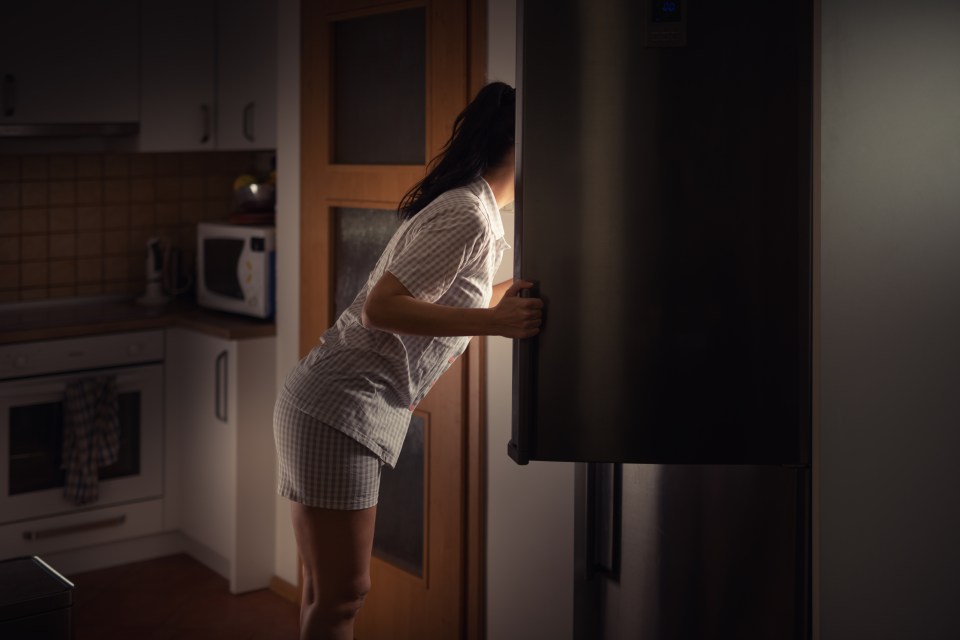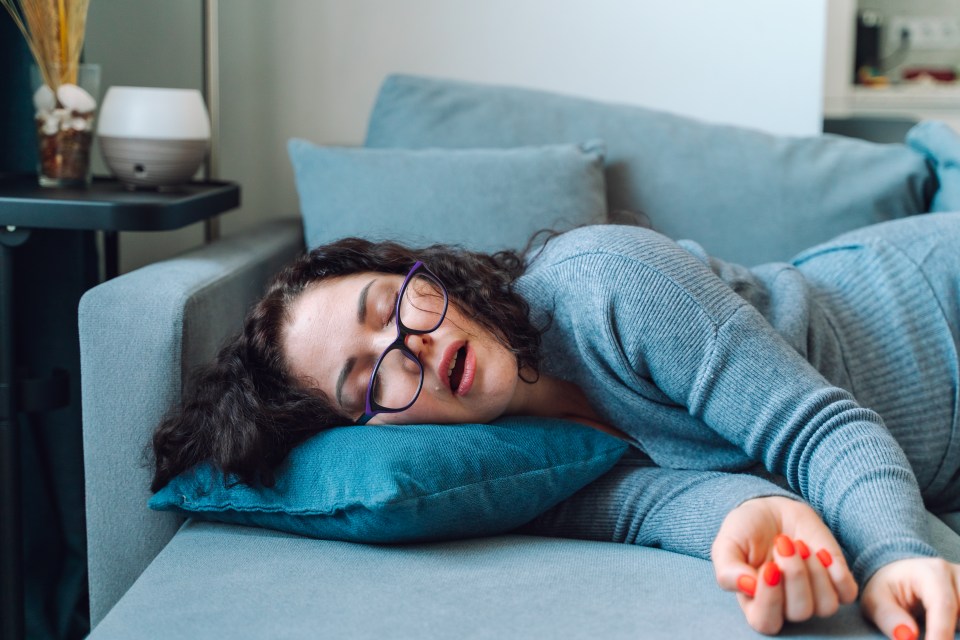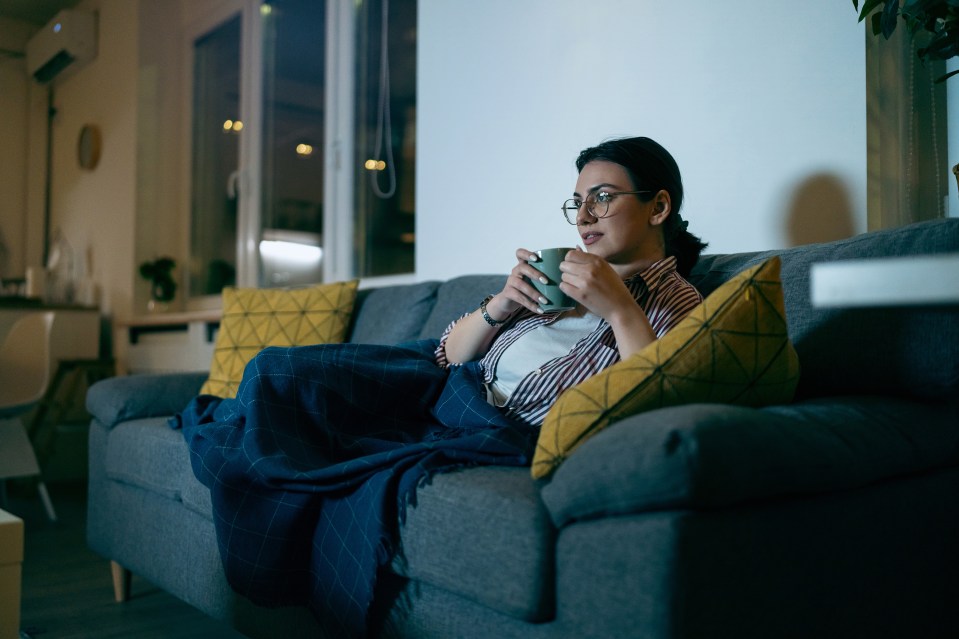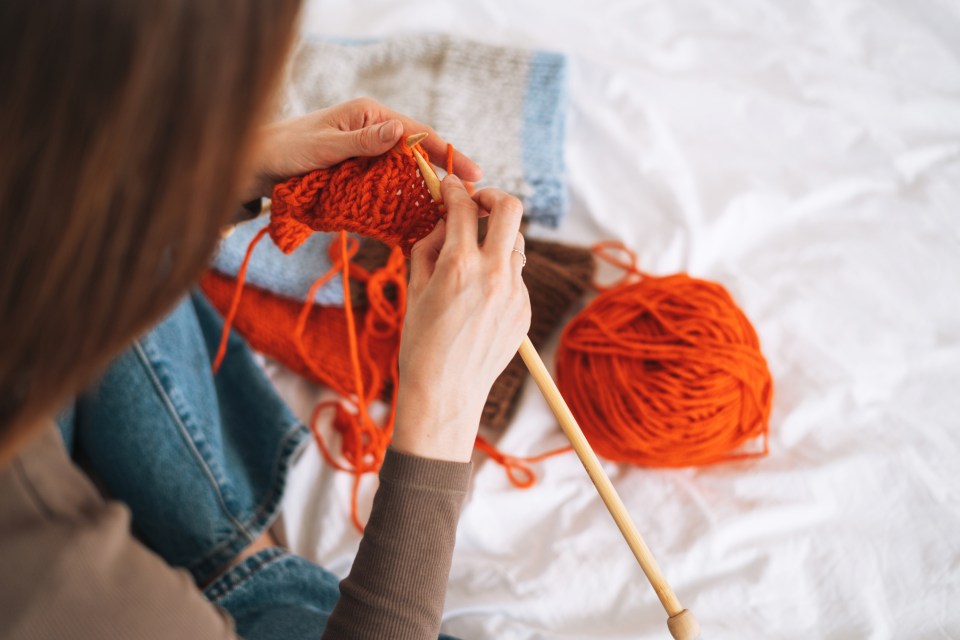YOU’VE been ‘good’ all day – eating clean, avoiding the biscuit tin, swapping sugars for sweetener and you even skipped dessert in the canteen at work.
But now you’re at home with your feet up in front of the TV and you just can’t resist raiding the fridge for a snack.
You’ve had dinner and you know you’ll be off to bed soon, but the call is just too strong.
A square of chocolate turns into a bar, a single biscuit turns into a whole pack, and that tub of ice cream in the freezer? Well, you’ve made a big dent in that too.
Sound familiar?
Three quarters of us reach for indulgent treats just before we go to bed, with chocolate, crisps, biscuits and buttered toast the most common culprits, research shows.
That’s despite scientists repeatedly suggesting this could be detrimental to our health.
A study published in the journal Appetite found that those who consumed 20 per cent or more of their daily calories after 8pm were twice as likely to be obese.
Separate research by Harvard University found eating after 10pm made people store more fat and even feel hungrier and burn fewer calories the following day.
And an investigation published in the International Journal of Obesity found that eating more calories in the morning versus the evening could actually lower your risk of becoming overweight by nearly 50 per cent.
So how do you combat the nighttime munchies?
Hannah Truement, dietetic medicine specialist and lead nutritionist at Body Fabulous, tells Sun Health: “Willpower can be particularly elusive in the evening.
“A key factor is mental fatigue, which can occur after a long day of making decisions and managing stress, leaving our cognitive resources somewhat depleted.
“This can then make it harder to exercise self-control.”
We actually make around 35,000 decisions a day.
This is exhausting, so come the evening, we naturally crave quick hits of energy.
That’s why biscuits, chocolate and sugary desserts are often eaten in excess.
But emotional factors can also come into it.
“Stress or boredom often surface later in the day, which can trigger the desire for comfort foods that provide an emotional boost,” says Hannah.
Sick of your snacking? Here’s how to nip those evening snack sessions in the bud and show your dwindling willpower who’s boss…
1. SORT YOUR SLEEP OUT
YOU’VE likely experienced the hunger that comes following a poor night’s sleep.
But when you’re exhausted, it’s not necessarily willpower that’s the issue, it’s your hormones.
“Sleep deprivation disrupts ghrelin and leptin, which regulate appetite,” says neuroscientist Anne-Sophie Fluri.
“Ghrelin signals hunger and it increases when sleep is inadequate. Meanwhile, leptin, which signals fullness, decreases.
“This imbalance leads to increased cravings for energy-dense, high-fat foods.”
A study in the journal Nutrients found that people who slept less than normal (5.5 hours versus 8.5) ate more high-carbohydrate snacks after 7pm than those on a regular schedule.
“If you go to bed at a decent time in the evening you help your body regulate its hormones, including those associated with hunger and fullness,” Anne-Sophie adds.
2. STOP BEING RESTRICTIVE
IF your breakfast and lunch consist of very little, or even nothing at all, then it’s only natural that your body will be hungry and desperate for more food.
“When we don’t fuel ourselves properly throughout the day or we restrict our food intake too much, we often feel deprived (physically and emotionally), which can lead to stronger cravings and overeating, even bingeing, in the evening,” says Hannah.
Anne-Sophie adds: “Your everyday diet should fuel you. Remember, your brain alone needs around 500 calories during the day just to function!”
Urge surfing doesn’t sound like a fun exercise but it works, and cravings typically go within 15 to 20 minutes
Anne-Sophie Fluri
Calories are a measure of the amount of energy in an item of food or drink.
When we eat and drink more calories than we use, our bodies store the excess as body fat. If this continues over time, we may put on weight.
On average, the NHS recommends men eat 2,500 calories a day, and women 2,000 to maintain a healthy weight.
But exactly how many we need depends on many factors, including our age, height, activity levels and genetics.
Not sure what your calorie count should be? Check out the TDEE Calculator, which allows you to work out how many calories you need based on your daily activity.
This can help you to split your calories more evenly across the day.
3. FOLLOW THE ‘N-F-A RULE’
IF you usually wind down after dinner with a bar of chocolate, break the habit with a non-food activity (N-F-A) that still provides dopamine (the feel-good neurotransmitter).
“For many people I know, their skincare routine is a mini ritual they do to help signal the end of the day and start slowing down,” says Anne-Sophie.
“For others it could be a cup of tea and a book. Find what works for you.
“When snacking is used as a form of comfort, stress relief or because you’re bored, making sure that you are engaged with something else – that’s also calming – is key.
“Do it mindfully and be fully present with whatever it is that you’re doing as this forces your brain to be present, and therefore you’re less likely to go back to old habits.”
4. FAIL TO PREPARE, PREPARE TO FAIL
IF your breakfast is a croissant, lunch is a quick on-the-go sandwich and your snacks are processed and lacking in nutrients, your body won’t be getting the balance of nutrition it needs.
When this happens, it craves more food.
It’s therefore vital to plan and schedule nutrient-dense meals to avoid those evening munchies.
Anne-Sophie says: “You need to eat a balance of protein, fibre and healthy fats earlier in the day as this can reduce evening cravings.
“Plus, if you know what you’re eating and when, you’re less likely to reach for snacks to keep you going.”
At your evening meal, eat a decent portion of protein (sometime’s dubbed ‘nature’s Ozempic), such as chicken, beef, turkey, eggs, dairy, tofu or beans.
This will help to keep you fuller for longer, reducing your snack cravings, according to research in the Journal of the Academy of Nutrition and Dietetics.
Filling fibre can be found in whole grains, vegetables and legumes, while avocados, nuts, seeds and olive oil are great sources of healthy fats.
What a balanced plate looks like
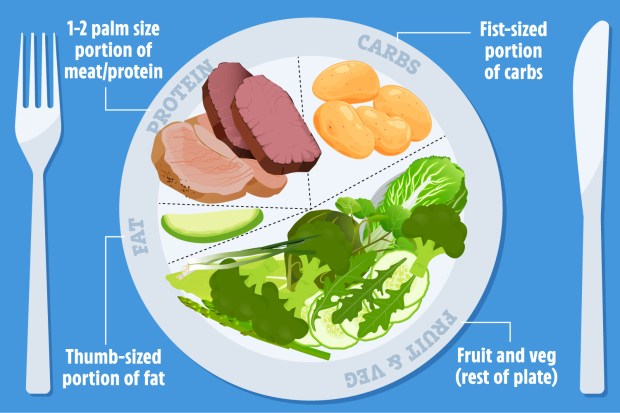
How can you make sure you are eating a balanced, filling and nutritious plate at every meal?
Think of your plate divided into different food groups – protein, carbs, fat and fruit and veg.
Protein: David Wiener, training and nutrition specialist at AI-based lifestyle and coaching app Freeletics, told The Sun: “Aim for one to two palm-size portions of lean protein in each meal.”
Protein includes meat (chicken, turkey, pork, beef), beans, peas, lentils and fish.
The NHS Eatwell Guide says to choose lean cuts of meat and mince, and eat less red and processed meat like bacon, ham and sausages.
Aim for at least two portions (two x 140g) of fish every week, one of which should be oily, such as salmon, sardines or mackerel.
Carbs: Carbohydrates should make up about a third of your plate, or a fist-sized portion.
The Eatwell Guide says: “Choose higher fibre or wholegrain varieties, such as wholewheat pasta and brown rice, or simply leave the skins on potatoes.
“There are also higher fibre versions of white bread and pasta.
“Starchy foods are a good source of energy and the main source of a range of nutrients in our diet.”
Fat: Generally the advice is to think of fat like a thumb-sized amount on your plate.
The Eatwell Guide says: “Remember all types of fat are high in energy and should be eaten in small amounts.
“These foods include chocolate, cakes, biscuits, sugary soft drinks, butter, ghee and ice cream.
“They’re not needed in our diet, so should be eaten less often and in smaller amounts.”
But a small amount is still essential for the diet. Try and eat more unsaturated fats (avocado, nuts, olive oil), which are healthier than saturated fats (butter, hard cheese, sour cream).
Fruit and veg: David says: “Make sure you also get lots of colourful fruit and vegetable carbohydrates too.
“Aim for at least five of these portions a day.
“One to two fist-sized portions of fruits and vegetables with every meal is generally recommended.”
Fruit and veg can be fresh, frozen, tinned or dried. You can roast, boil, steam or grill veggies.
5. TRY ‘URGE SURFING’
URGE surfing is a mindfulness technique that can help you manage cravings, according to Anne-Sophie.
“Sit with the feeling of a craving and observe the thoughts you have without judging them, rather than acting on them,” she says.
“It doesn’t sound like a fun exercise but it works, and cravings typically go within 15 to 20 minutes.”
A study by Maastricht University found that people who practised urge surfing experienced fewer cravings and were less likely to indulge in emotional eating.
6. SET A KITCHEN CURFEW
OFTEN when you know there’s a limit or cut-off to something, it mentally draws a line under that activity.
So set yourself a curfew for going into the kitchen to hunt down snacks.
“Choose a time such as 7pm or 8pm to stop eating and avoid the kitchen altogether,” Hannah says.
“This creates a boundary that helps separate eating from winding down, which can help reduce mindless snacking.”
7. BRUSH YOUR TEETH
WE all know the importance of brushing teeth before bed to avoid plaque, tooth decay and gum disease.
But it can also help deter you from eating, according to Anne-Sophie.
“When you brush your teeth in the evenings, your brain learns to associate tooth brushing with the end of the day and also, the end of eating for the day,” she says.
“This becomes a conditioned behaviour, similar to how you feel sleepy when you start dimming the lights.”
Plus, if you’ve ever tried eating food straight after brushing with a minty fresh toothpaste, you’ll know that it never tastes good.
“Your brain knows that it won’t get the same reward since the food will taste unpleasant and this can help reduce your motivation to eat,” Anne-Sophie adds.
8. KEEP YOUR HANDS BUSY
OPENING a packet and putting food in your mouth can become an automatic motor behaviour, especially when you’re watching TV or scrolling on social media, according to Anne-Sophie.
So, why not try keeping your hands busy with something else?
“Activities like knitting or drawing create incompatible motor actions, physically blocking the pathway of reaching for food,” she says.
“Anything that grounds you in the moment, gives your hands something to do, and rewards your brain can be helpful here.”
CAN YOU TRAIN YOUR WILLPOWER?
THE short answer is, yes.
“Willpower is like a muscle, it can be strengthened with practise,” says Anne-Sophie.
“Small wins build self-control over time. Start with manageable goals and gradually increase challenges.
Hannah adds: “Tracking your progress is also a useful tool so you can monitor where you went wrong and adjust moving forward and, most importantly, celebrate your wins.”
She recommends being as specific as possible with your goals.
“Instead of saying, ‘I want to stop snacking in the evening’, aim for, ‘I will stop snacking after 8pm for the next week’,” Hannah says.
“Self-compassion is also key here as being too hard on yourself after a slip-up can demotivate you and potentially impact your self-esteem, which can impact decision making.”
Wherever possible, focus on progress, not perfection.
Anne-Sophie says: “Remember that willpower is often context dependent, so you want to create an environment that supports healthy habits.
“Keep tempting snacks out of sight, establish a structured evening routine and plan your meals.”
Struggling with a particular craving? It may not be caused by hunger.
“Check in with your emotional state as stress, boredom and fatigue could be driving cravings,” says Hannah.
What your food cravings really mean
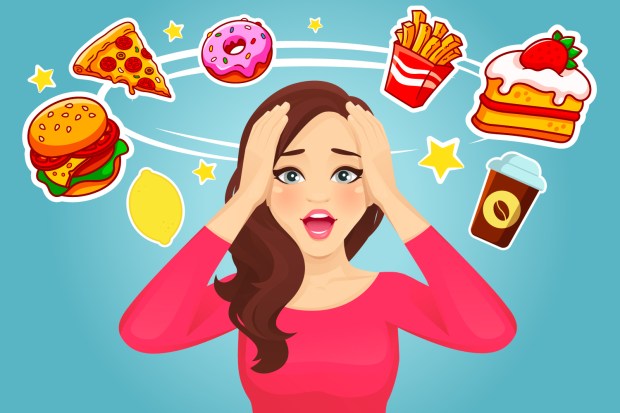
By Alice Fuller, Health Features Editor
CAN’T resist reaching for a biscuit by 11am or crying out for crisps come 4pm?
Whether we prefer sweet or savoury, many of us are consumed by food cravings throughout the day.
And that can be normal. Our bodies go through various changes that often leave us wanting something specific.
But sometimes, the foods and drinks we desire, and when, can indicate there might be something else going on beyond hunger.
And in some cases, it can be a sign you need medical attention.
Dr Crystal Wyllie, a GP and leading clinician at ZAVA Online Doctor, tells Sun Health: “Cravings can reveal a lot about what your body or mind needs.
“They are driven by a mix of biological and environmental factors, such as hormonal changes in pregnancy or menstruation, nutrient deficiencies, shifts in blood sugar, and social settings.
“Emotions also play a big role. Stress, anxiety or boredom can lead to cravings as certain foods provide a temporary sense of pleasure and relief.
“On top of that, the dopamine released when you eat these foods can reinforce your cravings over time.”
But how can you tell the difference?
“If you’re constantly reaching for sweets, cakes or biscuits, for example, it’s likely your body is seeking a serotonin boost,” Dr Wyllie says.
“Sugary treats can offer a quick mood lift, which is why we often crave them when we’re feeling low or bored.
“Similarly, cravings for savoury snacks like crisps, nuts or cheese can indicate your body needs more sodium or protein.
“This is particularly common if you’ve just been to the gym or you’re dehydrated.
“Hormonal changes during your period can also trigger cravings for energy-dense foods like chocolate, pasta or fried food, as your body works harder and requires extra fuel.
“Recognising these patterns can help you address your cravings more healthily, and help you choose foods that satisfy your body’s needs without overindulging.
“It’s important that cravings don’t lead to overeating, especially with calorie-rich foods (like those that are sugary or fatty) as this can lead to health issues such as obesity.
“All food groups should be consumed in moderation, bearing in mind your total calorie intake per day.”
So whether you’re desperate for chicken nuggets, doughnuts or garlic bread, you can read more about what could be driving your cravings in the full article here.


